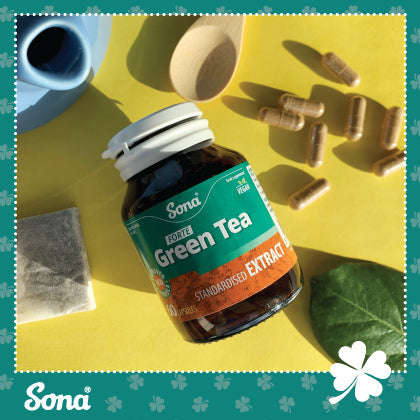
Green tea is one of the most popular teas in the world. Traditionally in China and Japan, the tea was used for medicinal and healing purposes.
In this article we discuss three benefits of green tea as well as the advantages of taking a green tea extract supplement.
- High concentrations of antioxidants and polyphenols.
Green tea is potent in polyphenols, which work similarly to antioxidants, helping to scavenge harmful free radicals which can cause cell damage, ageing and illness. More specifically, green tea contains a polyphenol catechin called epigallocatechin-3-gallate (EGCG).
Various studies have shown that EGCG can be very powerful and even have the potential to treat illness and disease. While you can get this catechin via drinking green tea, the use of supplements may be more beneficial due to a more concentrated and standardised amount of polyphenols in each capsule.
- Improved concentration, brain and mental function
Green tea contains an amino acid called L-theanine. Amino acids are building blocks which make up proteins but can also have individually specific benefits themselves.
L-theanine, combined with the small amount of caffeine in green tea can help to give us the mental boost we need, without the jittery effects we often can get from coffee. This is due to the calming and relaxing effect of l-theanine on our brain.
The combination of both caffeine and l-theanine produces an alert but focused effect, rather than alert but jittery and anxious form caffeine alone. In this way, it is not as common to suffer from an afternoon caffeine crash from coffee, but instead with green tea, you can enjoy sustained and lasting energy throughout the day.
- Protective of brain health
Thanks to the high potency of polyphenols and antioxidants in green tea, those who consume green tea may be at lower risk of developing certain neurodegenerative disorders such as Alzheimer’s and Parkinson’s’ disease. Multiple studies have found that the catechins in green tea may help to protect our brain functionality, which in turn may help to lower the risk of developing dementia.
Supplementing
While we can get some nutritive value, comfort, and hydration from drinking green tea, many people do not like the taste of green tea and prefer to receive a more concentrated amount of the polyphenols from supplements.
Sona Green Tea Forte capsules are standardised, so each capsule contains 40% polyphenols and beneficial flavonoids. These powerful phytochemicals are a beneficial addition to boost our diet. Sona Green Tea capsules contain the highest amount of polyphenols per capsule than any other supplement. Each capsule also contains 200mg of green tea per capsule and the natural green tea is screened a milled prior to encapsulation so our bodies can absorb it quickly.
References
Egashira, N., Hayakawa, K., Osajima, M., Mishima, K., Iwasaki, K., Oishi, R. and Fujiwara, M., 2007. Involvement of GABAA receptors in the neuroprotective effect of theanine on focal cerebral ischemia in mice. Journal of pharmacological sciences, 105(2), pp.211-214.
Eng, Q.Y., Thanikachalam, P.V. and Ramamurthy, S., 2018. Molecular understanding of Epigallocatechin gallate (EGCG) in cardiovascular and metabolic diseases. Journal of ethnopharmacology, 210, pp.296-310.
Kelly, S.P., Gomez-Ramirez, M., Montesi, J.L. and Foxe, J.J., 2008. L-theanine and caffeine in combination affect human cognition as evidenced by oscillatory alpha-band activity and attention task performance. The Journal of nutrition, 138(8), pp.1572S-1577S.
Nobre, A.C., Rao, A. and Owen, G.N., 2008. L-theanine, a natural constituent in tea, and its effect on mental state. Asia Pacific journal of clinical nutrition, 17.
Weinreb, O., Mandel, S., Amit, T. and Youdim, M.B., 2004. Neurological mechanisms of green tea polyphenols in Alzheimer's and Parkinson's diseases. The Journal of nutritional biochemistry, 15(9), pp.506-516.
